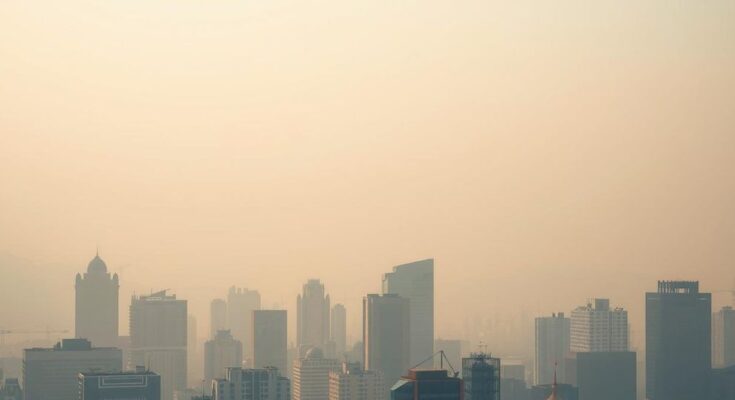Pakistan ranks among the top five most polluted countries, with PM2.5 levels significantly above WHO standards. The reliance on the recently terminated US air quality monitoring program has left gaps in data, complicating mitigation efforts. The escalation of climate change impacts further intensifies the smog crisis, stressing the urgent need for reliable pollution monitoring and greater control measures.
Pakistan continues to grapple with severe air pollution, ranking as one of the most smog-affected countries globally, as per recent data. The nation’s air quality falls significantly below the World Health Organization’s (WHO) recommended standards, with hazardous levels of particulate matter (PM2.5) that greatly exceed safe limits. In 2024, Pakistan was positioned among the top five most polluted countries, alongside Chad, Bangladesh, the Democratic Republic of Congo, and India.
The average PM2.5 concentration in Pakistan alarmingly exceeds the WHO’s safety threshold of 5 micrograms per cubic metre. Last year, only 17% of global cities met this safety limit. This smog crisis presents a major health risk and hampers ongoing efforts to enhance air quality, particularly in urban centres like Lahore and Karachi which experience severe pollution, particularly during winter months when fog and industrial emissions are at their peak.
The reliance on external air quality monitoring has emerged as a considerable challenge. For years, real-time pollution data from the US State Department’s air quality sensors, located at its embassy and consulate buildings, has been essential for many developing nations, including Pakistan. However, the US has recently terminated this monitoring programme due to budgetary constraints, leaving Pakistan susceptible to significant gaps in pollution data, thus complicating future mitigation strategies.
Christi Chester-Schroeder, the air quality science manager at IQAir, underscored the implications for countries like Pakistan, which often relied on these monitoring stations for real-time air quality updates. She remarked, “The loss of these monitoring stations is a major blow to efforts in regions where pollution data is sparse.” As global pollution escalates, climate change further exacerbates the situation, leading to prolonged and severe forest fires in regions such as South East Asia and South America, which negatively impacts air quality.
The termination of the US air quality programme could detrimentally impact at least 34 countries, including Pakistan, causing substantial losses in reliable pollution data. Christa Hasenkopf, director of the Clean Air Program at the University of Chicago’s Energy Policy Institute, characterized the discontinuation as a considerable setback, stating, “It’s a giant blow to air quality efforts worldwide.” In light of escalating pollution influenced by climate change and the loss of crucial monitoring tools, Pakistan faces significant challenges in addressing its smog crisis, stressing the urgent need for reliable air quality data and more stringent pollution control measures.
In summary, Pakistan’s air pollution crisis is alarming, as the country ranks among the top globally for smog levels, far exceeding WHO standards. With the recent termination of the US air quality monitoring program, Pakistan faces further difficulties in tackling this issue. As climate change exacerbates these conditions, it is imperative for Pakistan to enhance efforts in acquiring reliable air quality data and implementing stronger pollution control measures to address its critical smog situation.
Original Source: tribune.com.pk




